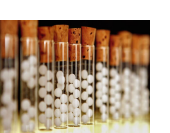Note that some links will break as pages are moved, websites are abandoned, etc.
If this happens, please try searching for the page in the Wayback Machine at www.archive.org.
The future of the Bristol Homeopathic Hospital is in doubt because not enough patients are using it. BBC News (5th June 2008) [1 min 38 secs]
"Research clearly suggests that this alternative therapy doesn't work except as a placebo…the absurdity of homoeopathy will become apparent if you think about one of its treatments, namely a flu remedy called Oscillococcinum. Each year a homoeopathic company called Boiron kills a muscovy duck and then extracts its heart and liver. This is then repeatedly diluted to create the entire world's supply of the flu remedy that generates sales of more than $20 million. There is no reason why a duck's heart and liver should cure flu, particularly when it is so diluted that the resulting pills contain no extract of duck. This has to be the ultimate quack remedy." Article by Simon Singh, The Times (23rd April 2008)
"Homoeopathic medicine is founded on a bogus philosophy. Its continued use is a drain on NHS resources and can endanger the health of patients." Article by Simon Singh, New Statesman (17th April 2008)
"Homeopathy is becoming the highest profile victim of the Government's drive to promote cost-effective use of NHS resources, with PCTs across the country stopping funding for the controversial treatment…Professor Edzard Ernst, professor of complementary medicine at Peninsula Medical School, Exeter, and a former homeopath himself, said he supported moves to withdraw funding for homeopathy as it was nothing more than a placebo. 'There can be no cost-effectiveness without effectiveness,' he warned." Pulse (30th January 2008)
A critical review of the 43 items contained under the 'evidence' tab of the Homeopathy section of the NHS Complementary and Alternative Medicine Specialist Library. Apgaylard (19th November 2007)
Using the July 2007 issue of 'Homeopathy', four science writers examine the ostensibly scientific evidence in support of homeopathic medicine — an exercise that should provide everyone with a greater understanding of the features that separate science from pseudoscience. Six page article by John Timmer, Chris Lee, Jonathan M. Gitlin and Matt Ford (11th September 2007) [Also see link immediately below]
A commentary by Professor Edzard Ernst, British Journal of Clinical Pharmacology (September 2007) [pdf]
A critical look at claims made for the use of homeopathy in the treatment and management of asthma, HIV/AIDS, TB, and malaria. Includes strong criticism of the Society of Homeopaths. Gimpy's Blog (original article published by The Quackometer on 16th August 2007)
"Homeopathic remedies are nothing more than sugar and water. No evidence exists to suggest that water contains impregnated memory or that sub-atomic fields have ever affected anyone."Article by Stephen Sagar MD Current Oncology (August 2007)
"Last week I applauded the courage of Dr. Born for fighting against pseudoscience and quackery in the UK National Health Service by urging them to drop coverage for the utter nonsense that is homeopathy. Peter Fisher, director of the Royal London Homeopathic Hospital, has now answered Dr. Born with an open letter of his own. It is a droll patchwork of unsupported assertions, straw men, propaganda, and assorted other logical fallacies." A critical commentary on Dr Peter Fisher's open letter by Steven Novella, MD, NeuroLogica Blog (29th May 2007)
Includes a link to the 21st May 2007 open letter sent to Primary Care Trusts by Professor Gustav Born (and others) calling for a boycott of homeopathy. The Times (23rd May 2007)
A critical commentary on homeopathy from Professor Michael Baum, professor emeritus of surgery at University College London. Daily Mail (1st May 2007)
"The Queen loves it. But alternative medicine centre's future looks uncertain as more NHS trusts axe funding." The Observer (8th April 2007)
A critical look at the promotion of homeopathy in the 21st century in which the role of HRH Prince Charles, The Prince of Wales, is compared to that of Albus Dumbledore, headmaster of Hogwarts School of Witchcraft and Wizardry. By Gerald Weissmann, M.D., Editor-in-Chief, FASEB Journal — Federation of American Societies for Experimental Biology (September 2006)
"It is outrageous that the NHS should knowingly promote this quackery. And it is knowing. The NHS Direct website points out that homoeopathy is contrary to everything we know about chemistry and medicine, and that there is no experimental evidence to support its preposterous claims. Yet the NHS still promotes it…." Jamie Whyte, The Times (15th July 2006)
Review of the BBC2 Newsnight investigation which revealed that every one of ten randomly selected homoeopathic clinics and pharmacies in London was willing to recommend its products as an alternative to proven prophylactic drugs for malaria. The Bad Homeopath (14th July 2006) For more reviews of the programme's segment on homeopathy and malaria please click on the 'Homeopathy > Lethal practices' link at the top of this page.
"If any money is going spare for the NHS, let's spend it on real medicine that actually works." A commentary by Sue Blackmore, The Guardian (23rd May 2006)
"It is likely that this debate could go on for another 200 years, but to me it is entirely obvious. The remedies do not work." Professor Edzard Ernst, Daily Mail (23rd May 2006)
In this House of Lords debate on homeopathy Lord Taverne asked Her Majesty's Government whether they had any proposals to withdraw National Health Service (NHS) funding for homeopathy. He suggested that if the government wished to continue to fund homeopathy they should also fund coloured water and witchcraft which was likely to be just as effective. Hansard text, United Kingdom Parliament (23rd January 2006) [Scroll down to the 'Homeopathy' section. To view the 2nd page of the debate click on 'Next Section' ]
Edzard Ernst, Professor of Complementary Medicine at Exeter University, UK, denounces homeopathy as ineffective: "Study after study has shown it is simply the purest form of placebo. You may as well take a glass of water than a homeopathic medicine." The Observer (18th December 2005)






